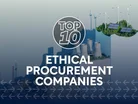
10. Patagonia
Revenue: US$1.5bn
Employees: 3,000
CEO: Ryan Gellert
Founded: 1973
The clothing brand Patagonia is well known for its environmental and social responsibility. From a strong emphasis on fair labour practices through its supply chain, working closely with its suppliers to ensure they are treated ethically and receive fair wages in safe working conditions and reasonable working hours. Patagonia focuses on its environmental sustainability, alongside its six environmentally friendly business practices.
The company continues to innovate and lead by example in the apparel industry.
9. Ben & Jerry's
Revenue: US$450m
Employees: 999
CEO: Dave Stever
Founded: 1978
Ben & Jerry's, the beloved ice cream company renowned for its quirky flavours and social activism, has long been committed to ethical procurement practices. At the core of its mission lies a dedication to social responsibility and sustainability, reflected in every scoop they serve.
From fair trade-certified ingredients, ensuring farmers get a fair price for their produce, to prioritising ingredients through sustainable agricultural practices. With a focus on reducing greenhouse gas emissions and water usage, underscore its commitment to environmental stewardship.
8. IKEA
Revenue: US$51bn
Employees: 219,000
CEO: Jon Abrahamsson Ring
Founded: 1943
IKEA, the Swedish furniture giant, showcases its commitment to ethical procurement practices.
With its supplier code of conduct, setting clear standards for ethical, social, and environmental standards. Strong investment in sourcing sustainable materials for its products, including responsibly sourced wood and renewable materials, and a commitment to renewable energy.
IKEA's unwavering dedication to ethical sourcing sets a high standard for the industry, demonstrating that business success and social responsibility can go hand in hand.
7. Unilever
Revenue: US$64bn
Employees: 128,000
CEO: Hein Schumacher
Founded: 1930
Unilever, a multinational consumer goods company, focuses on ethical procurement to ensure its products are sourced responsibly.
The company traces its ingredients to ensure they're produced sustainably and ethically, promoting sustainable farming practices to protect the environment and improve farmers' livelihoods, and transparency with stakeholders to address challenges and improve sustainability.
6. Capgemini
Revenue: US$24bn
Employees: 359,600
CEO: Aiman Ezzat
Founded: 1967
Capgemini is a global leader in consulting, digital transformation, technology, and engineering services. The company prioritises sustainability, diversity, and inclusion in their procurement processes. Capgemini strives to source materials and services responsibly, ensuring that suppliers adhere to ethical standards and environmental regulations. As well as promoting diversity and inclusion by working with suppliers from various backgrounds and supporting minority-owned businesses.
5. L'Oréal
Revenue: US$44bn
Employees: 87,400
CEO: Nicolas Hieronimus
Founded: 1909
L'Oréal is a global beauty company that owns brands such as Lancôme, Maybelline, Garnier, and Kiehl's.
It is committed to sourcing ingredients and materials responsibly, ensuring that they meet high ethical and environmental standards. L'Oréal works closely with suppliers to promote fair labour practices, respect for human rights, and environmental sustainability throughout the supply chain.
The beauty company is transparent about their procurement practices and regularly monitors supplier performance to ensure compliance with ethical standards.
4. The Coca-Cola Company
Revenue: US$45.8bn
Employees: 79,100
CEO: James Quincey
Founded: 1892
The Coca-Cola Company, a global beverage giant, prioritises responsible sourcing, ensuring suppliers adhere to environmental and social standards. It promotes fair labour practices, human rights, and environmental sustainability throughout its supply chain. Regular monitoring and audits ensure ethical compliance. Initiatives improve worker livelihoods and minimise environmental impact. Collaborating with industry partners, NGOs, and stakeholders, Coca-Cola addresses global supply chain challenges like water stewardship and sustainable sourcing.
3. Salesforce
Revenue: US$34.86bn
Employees: 79,390
CEO: Marc Benioff
Founded: 1999
Salesforce, a leader in CRM and enterprise solutions, prioritises environmental sustainability in procurement. It minimises its footprint by choosing suppliers with sustainable practices, reducing emissions, conserving resources, and promoting renewable energy. Collaborating with suppliers, Salesforce ensures ethical sourcing and labour practices. Transparency and accountability are paramount; the company maintains open communication, monitors performance, and conducts audits to uphold ethical standards and environmental responsibility.
2. Ecolab
Revenue: US$15.3bn
Employees: 48,000
CEO: Christophe Beck
Founded: 1923
Ecolab is a company that focuses on providing water, hygiene, and energy technologies and services.
In terms of ethical procurement, Ecolab emphasises sustainability and responsible sourcing practices. They strive to minimise their environmental footprint and promote social responsibility throughout their supply chain.
Ecolab works with suppliers who share their commitment to ethical business practices, including environmental stewardship, labour rights, and diversity and inclusion. They aim to build long-term partnerships with suppliers who align with their values and contribute to positive social and environmental impacts.
Through their procurement processes, Ecolab seeks to ensure transparency, fairness, and integrity. They prioritise suppliers who demonstrate compliance with relevant regulations and standards, as well as those who continuously improve their practices to minimise environmental impact and support communities.
1. Accenture
Revenue: US$64.11bn
Employees: 733,000
CEO: Julie Sweet
Founded: 1989
Accenture, a global professional services firm, is renowned for its ethical procurement practices. Recognized by esteemed sources like Everest Group, HfS Research, and IDC, Accenture's commitment to ethical procurement is evident through its Corporate Services & Sustainability organisation.
Accenture's procurement function extends beyond traditional activities, encompassing contractor sourcing, ventures, payables management, and sustainability initiatives. It aligns with clients' sustainability goals by promoting responsible sourcing and carbon-neutral production.
The firm follows a Code of Business Ethics guiding its actions, including procurement, emphasising compliance, client delivery, and social responsibility. Accenture also prioritises diversity and inclusion, believing they drive innovation, collaboration, and social responsibility.
******
Make sure you check out the latest edition of Procurement Magazine and also sign up to our global conference series - Procurement & Supply Chain 2024 & Sustainability LIVE 2024
******
Procurement Magazine is a BizClik brand.



